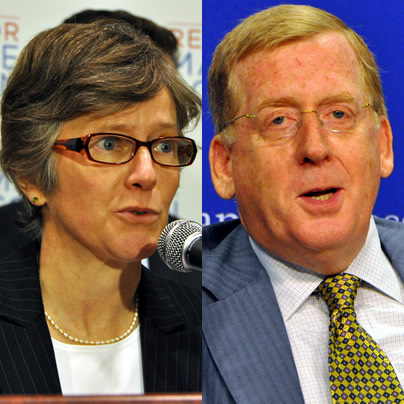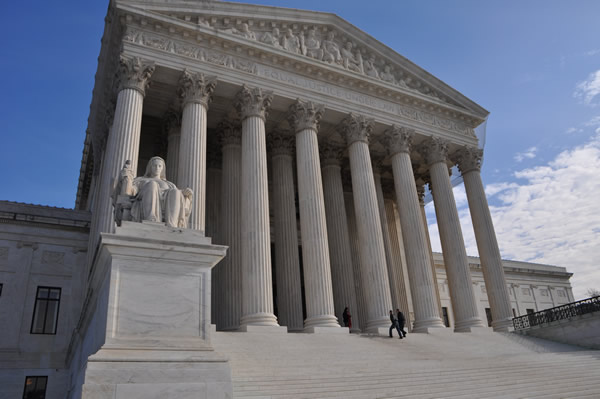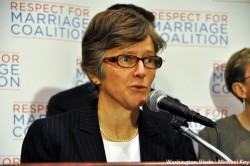Politics
10 years later, another Supreme wait
Attorneys for landmark gay rights cases compare their significance to pending lawsuits


The U.S. Supreme Court (Washington Blade file photo by Michael Key)
Expectations are high as the wait continues for two decisions expected in June on marriage cases before the U.S. Supreme Court, just as they were 10 years ago when gay rights supporters awaited what amounted to landmark rulings in two other cases.
In 2003, two cases reshaped the landscape for gay rights: the U.S. Supreme Court decision in Lawrence v. Texas, which struck down state sodomy laws throughout the country, and the Massachusetts Supreme Court decision in Goodridge v. Department of Public Health, which for the first time led to the legalization of marriage equality in a U.S. jurisdiction.
The two cases currently before the court — Hollingsworth v. Perry, which aims to strike down California’s Proposition 8, and United States v. Windsor, which is challenging the Defense of Marriage Act — are different in many respects from the cases 10 years ago. Lawrence was related to sodomy laws and Goodridge was a state lawsuit that resulted in a change only in Massachusetts. Still, they’re similar in terms of their potential significance.
The two attorneys who made arguments before the courts in the decades-old lawsuits — in the Goodridge case, Mary Bonauto, civil rights director for Gay & Lesbian Advocates & Defenders, and, in the Lawrence case, Paul Smith, a partner at Jenner & Block — acknowledged the magnitude of the cases both then and now, but said it’s hard to compare the significance of the older ones to the newer ones.
Smith said we won’t know the significance of the DOMA and Prop 8 cases until the Supreme Court rules on them, but touted the Lawrence decision striking down sodomy bans across the country as significant in any event.
“It provided the foundation for all the progress that has been made on marriage and other forms of discrimination over the past 10 years,” Smith said. “It did that by establishing that our relationships are just as important and valuable as different-sex relationships and by saying that the government can’t use morality as a justification for interfering with individual choices about who to love and how. With those principles in place it’s very hard for anyone to come up with a legitimate and persuasive justification for discrimination based on sexual orientation.”
Similarly, Bonauto said “it’s not really easy” to compare the significance of the Goodridge case to the Perry and Windsor lawsuits, recalling the different cultural climate 10 years ago in which the Massachusetts case was argued.
“In 2003, these waters were largely uncharted,” Bonauto said. “There were zero marriage states, a civil union system in Vermont, and 36 states with discriminatory statutes and four states with amendments. But then, as now, we were right; right on the constitutional principles and the utter absence of legal justifications for this discrimination.”
Those court rulings — in particular the Goodridge decision because it was the first successful case for full marriage equality in the United States — paved the way for 11 more states to approve same-sex marriage over the course of 10 years, including the legalization of marriage equality in Minnesota just this week.
Just as observers are parsing statements from justices now in an attempt to determine what the court may rule on Prop 8 and DOMA, followers of the court cases a decade ago were also trying to predict the future based on what was said during oral arguments.
In Lawrence, Smith said moderate justices at the time — Associate Justice Anthony Kennedy and then-Associate Justice Sandra Day O’Connor — were “uncharacteristically quiet,” making it difficult to predict how the court would rule.
“But we took hope from the fact that they didn’t say anything negative,” Smith added. “We were relatively optimistic that the court would strike down the sodomy laws once the court decided to take the case.”
For Goodridge, Bonauto said the wait was different from now in two regards: first because same-sex marriage wasn’t legalized anywhere in the country at the time, and second because there was no set timeline for when the Massachusetts Supreme Court had to make a decision.
“We thought and hoped we were right on the timing,” Bonauto said. “There were a lot of nerves and uncertainty while we waited. The fact that we didn’t know when the decision would come — no clue at all — added to the nerves and fueled the rumor factory. In the end, the decision turned out to be beautifully written and world-changing.”
In the present, many observers believe that the Supreme Court will issue a decision that will strike down DOMA on its merits — either based on equal protection or federalism grounds — although issues of standing were examined.
For Prop 8, much attention has been given to justices’ interest in the standing of Prop 8 proponents to defend the measure in court. A determination that they lack standing would leave in place a lower court ruling and likely invalidate the ban on same-sex marriage in California.
The standing issues before the Supreme Court, as Bonauto noted, also means the wait for Goodrige was different because the Massachusetts Supreme Court couldn’t rule on this basis.
“There were no outs,” Bonauto said. “They had to decide whether denying marriage to gay couples violates the Constitution of the Commonwealth or not. And I was asked very specifically in oral arguments about Vermont civil unions and a remedy that would provide those protections, and I said, ‘That was not what the plaintiffs were seeking; they were seeking access to marriage itself.'”
Notably, the oral arguments in Lawrence v. Texas took place on March 26, 2003, which is exactly 10 years to the day that oral arguments took place in the Prop 8 case on March 26, 2013. A ruling was issued in the Lawrence case on June 26, 2003 just as a ruling is expected in the Prop 8 and DOMA cases in June 2013.
In the Goodridge case, oral arguments took place before the Massachusetts Supreme Court on March 3, 2003, but a decision wasn’t rendered until Nov. 18, 2003.

Mary Bonauto (Washington Blade photo by Michael Key)
It remains to be seen whether the wording of rulings from the Supreme Court will have the same power as the language that justices handed down a decade ago. The 4-3 ruling in the Goodridge case affirmed that same-sex couples had the right to marry with never before seen language.
“The question before us is whether, consistent with the Massachusetts Constitution, the Commonwealth may deny the protections, benefits, and obligations conferred by civil marriage to two individuals of the same sex who wish to marry,” the decision states. “We conclude that it may not. The Massachusetts Constitution affirms the dignity and equality of all individuals.”
In the Lawrence case, the 6-3 opinion written by Associate Justice Anthony Kennedy determined that the framers intended language in the U.S. Constitution to be reinterpreted by later generations in accordance with their vision of liberty.
“They knew times can blind us to certain truths and later generations can see that laws once thought necessary and proper in fact serve only to oppress,” Kennedy wrote “As the Constitution endures, persons in every generation can invoke its principles in their own search for greater freedom.”
Also unknown is how the public might react if the Supreme Court issues affirmative rulings for marriage equality in the Prop 8 and DOMA cases.
In 2003, the court ruling in Massachusetts — combined with then-San Francisco Mayor Gavin Newsom’s decision to issue marriage licenses to gay couples — sparked a national backlash that led in the next year to 11 states passing constitutional amendments banning same-sex marriage. Former President George W. Bush ran a successful re-election campaign in which he advocated for passage of a Federal Marriage Amendment.
But Bonauto was skeptical that the legalization of same-sex marriage led to the passage of state constitutional amendments and Bush’s re-election — saying the religious right wanted to enact the amendments anyway and analysis shows the marriage issue wasn’t as much a boon to Bush as it may seem on its face.
“By the time we had filed Goodridge, there were already 36 state statutes and four amendments,” Bonauto said. “So, for a lot of these states, they didn’t have anything else to do but to pass an amendment because they already had statutes barring marriage. So I really view this as political opportunism both with elected officials and also the organized right-wing. It was trying to cut us off and change the facts on the ground, so that they could isolate this debate and isolate this issue in certain states.”
Given the growing acceptance of marriage equality — one widely noted recent poll shows it enjoys support from 58 percent of the American public, compared to 30 percent support in 2003 — the negative reaction to any pro-gay rulings will likely be more restrained.
In the event the Supreme Court in June renders similarly favorable decisions in support of rights for gay couples, Bonauto predicted some would speak out in opposition, but the reaction generally would be favorable.
“There are going to be people who are going to say things, and some of them have echo chambers and bully pulpits and their blogs,” Bonauto said. “I don’t think we should equate that to a backlash. I just think that is what public discourse is like in 2013. I really believe that the overwhelming majority of Americans are at a point where they accept and embrace the freedom to marry for same-sex couples.”
Congress
Congress passes ‘Big, Beautiful Bill’ with massive cuts to health insurance coverage
Roughly 1.8 million LGBTQ Americans rely on Medicaid

The “Big, Beautiful Bill” heads to President Donald Trump’s desk following the vote by the Republican majority in the U.S. House of Representatives Thursday, which saw two nays from GOP members and unified opposition from the entire Democratic caucus.
To partially offset the cost of tax breaks that disproportionately favor the wealthy, the bill contains massive cuts to Medicaid and social safety net programs like food assistance for the poor while adding a projected $3.3 billion to the deficit.
Policy wise, the signature legislation of Trump’s second term rolls back clean energy tax credits passed under the Biden-Harris administration while beefing up funding for defense and border security.
Roughly 13 percent of LGBTQ adults in the U.S., about 1.8 million people, rely on Medicaid as their primary health insurer, compared to seven percent of non-LGBTQ adults, according to the UCLA School of Law’s Williams Institute think tank on sexual orientation and gender identities.
In total, the Congressional Budget Office estimates the cuts will cause more than 10 million Americans to lose their coverage under Medicaid and anywhere from three to five million to lose their care under Affordable Care Act marketplace plans.
A number of Republicans in the House and Senate opposed the bill reasoning that they might face political consequences for taking away access to healthcare for, particularly, low-income Americans who rely on Medicaid. Poorer voters flocked to Trump in last year’s presidential election, exit polls show.
A provision that would have blocked the use of federal funds to reimburse medical care for transgender youth was blocked by the Senate Parliamentarian and ultimately struck from the legislation — reportedly after the first trans member of Congress, U.S. Rep. Sarah McBride (D-Del.) and the first lesbian U.S. senator, Tammy Baldwin (D-Wis.), shored up unified opposition to the proposal among Congressional Democrats.
Congress
Ritchie Torres says he is unlikely to run for NY governor
One poll showed gay Democratic congressman nearly tied with Kathy Hochul

Gay Democratic Congressman Ritchie Torres of New York is unlikely to challenge New York Gov. Kathy Hochul (D) in the state’s next gubernatorial race, he said during an appearance Wednesday on MSNBC’s “Morning Joe.”
“I’m unlikely to run for governor,” he said. ““I feel like the assault that we’ve seen on the social safety net in the Bronx is so unprecedented. It’s so overwhelming that I’m going to keep my focus on Washington, D.C.”
Torres and Hochul were nearly tied in a poll this spring of likely Democratic voters in New York City, fueling speculation that the congressman might run. A Siena College poll, however, found Hochul leading with a wider margin.
Back in D.C., the congressman and his colleagues are unified in their opposition to President Donald Trump’s signature legislation, the “Big Beautiful Bill,” which heads back to the House after passing the Senate by one vote this week.
To pay for tax cuts that disproportionately advantage the ultra-wealthy and large corporations, the president and Congressional Republicans have proposed massive cuts to Medicaid and other social programs.
A provision in the Senate version of the bill that would have blocked the use of federal funds to reimburse medical care for transgender youth was blocked by the Senate Parliamentarian and ultimately struck from the legislation, reportedly after pressure from transgender U.S. Rep. Sarah McBride (D-Del.) and lesbian U.S. Sen. Tammy Baldwin (D-Wis.).
Torres on “Morning Joe” said, “The so-called Big Beautiful Bill represents a betrayal of the working people of America and nowhere more so than in the Bronx,” adding, “It’s going to destabilize every health care provider, every hospital.”
Congress
House Democrats oppose Bessent’s removal of SOGI from discrimination complaint forms
Congressional Equality Caucus sharply criticized move

A letter issued last week by a group of House Democrats objects to Treasury Secretary Scott Bessent’s removal of sexual orientation and gender identity as bases for sex discrimination complaints in several Equal Employment Opportunity forms.
Bessent, who is gay, is the highest ranking openly LGBTQ official in American history and the second out Cabinet member next to Pete Buttigieg, who served as transportation secretary during the Biden-Harris administration.
The signatories to the letter include a few out members of Congress, Congressional Equality Caucus chair and co-chairs Mark Takano (Calif.), Ritchie Torres (N.Y.), and Becca Balint (Vt.), along with U.S. Reps. Nikema Williams (Ga.), Hank Johnson (Ga.), Raja Krishnamoorthi (Ill.), Delia Ramirez (Ill.), Joyce Beatty (Ohio), Lloyd Doggett (Texas), Eleanor Holmes Norton (D.C.), Josh Gottheimer (N.J.), and Sylvia Garcia (D-Texas).
The letter explains the “critical role” played by the EEO given the strictures and limits on how federal employees can find recourse for unlawful workplace discrimination — namely, without the ability to file complaints directly with the Employment Opportunity Commission or otherwise engage with the agency unless the complainant “appeal[s] an agency’s decision following the agency’s investigation or request[s] a hearing before an administrative judge.”
“Your attempt to remove ‘gender identity’ and ‘sexual orientation’ as bases for sex discrimination complaints in numerous Equal Employment Opportunity (EEO) forms will create unnecessary hurdles to employees filing EEO complaints and undermine enforcement of federal employee’s nondiscrimination protections,” the members wrote in their letter.
They further explain the legal basis behind LGBTQ inclusive nondiscrimination protections for federal employees in the EEOC’s decisions in Macy v. Holder (2012) and Baldwin v. Foxx (2015) and the U.S. Supreme Court’s decision in Bostock v. Clayton County (2020).
“It appears that these changes may be an attempt by the department to dissuade employees from reporting gender identity and sexual orientation discrimination,” the lawmakers wrote. “Without forms clearly enumerating gender identity and sexual orientation as forms of sex discrimination, the average employee who experiences these forms of discrimination may see these forms and not realize that the discrimination they experienced was unlawful and something that they can report and seek recourse for.”
“A more alarming view would be that the department no longer plans to fulfill its legal obligations to investigate complaints of gender identity and sexual orientation and ensure its
employees are working in an environment free from these forms of discrimination,” they added.




















